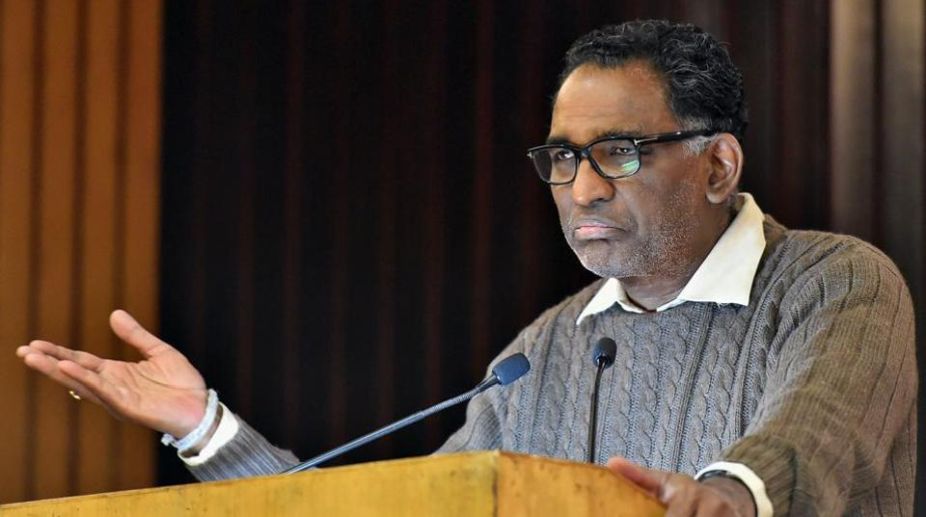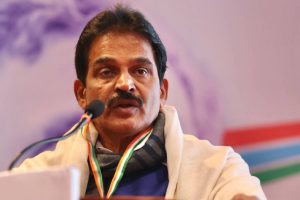Justice J Chelameswar has expressed hope that the 12 January press conference against Chief Justice of India Dipak Misra would not come in way of elevation of Justice Ranjan Gogoi, who was also part of the virtual revolt, as the next CJI.
At an event organised on Saturday by the Harvard Club of India on the ‘Role of judiciary in democracy’, Justice Chelameswar said if any such thing happened, it would mean that whatever concerns were raised by them in the presser were “true”.
CJI Dipak Misra retires on 2 October and Justice Chelameswar, who is the senior-most judge after him, would demit office on 22 June.
Supreme Court Judge Ranjan Gogoi is in line to become the Chief Justice of India in October 2018, succeeding Justice Dipak Misra, as the senior most judge of the Court.
“I am not an astrologer… I am not (worried). I hope that does not happen (Justice Gogoi being denied CJI’s position). If it happens, it will only prove what we said in the press conference was true,” Chelameswar said.
Justice Chelameswar, the senior-most judge after the CJI, had on 12 January held a press conference along with justices Gogoi, M B Lokur and Kurian Joseph, giving out a warning that democracy is at risk and mounted a virtual revolt against the CJI, raising questions on “selective” case allocation and certain judicial orders, sending shock waves across the judiciary and polity.
The four judges of the Supreme Court in their press conference had claimed that the situation in the top court was “not in order” and many “less than desirable” things have taken place.
The unprecedented move by the four judges had brought to fore the simmering differences between the country’s top judge and some senior judges in the apex court in recent months.
He said the four senior-most judges of the country never broke any time-honoured principle by addressing the media.
“I go somewhere, press would be there, they report something, is it prohibited? Similarly we were talking about the administrative problems. We were not breaching any of the time-honoured principles that we should not address the press,” Justice Chelameswar said.
‘Govt vs Collegium’
Justice Chelameswar also spoke on the tension between the government and the collegium on the issue of Memorandum of Procedure (MoP) for appointment of judges, and said the MoP was supposed to the finalised between the CJI and government after consulting with the senior most judges.
“If the purpose of the government and the collegium is to find out the most suitable candidate for the post, I don’t think there will be any difficulty. If the government thinks the elevation of any judge to the top court poses any danger to national security, all the government has to do is to list out the details on the basis it has come to the conclusion”, he said.
“I don’t think any collegium would be so unreasonable to reject the government’s opinion if it is supported with material. The collegium is a body of shifting mass. We hold it on trust of the nation for the people,” Justice Chelameswar said.
‘Impeachment not a solution’
Justice Chelameswar also said that impeachment could not be an answer to every question and problem and there was need to correct the system.
“The other day, someone was asking for my impeachment. I don’t know why this nation is worried about impeachment so much. In fact we (along with Justice Gogoi) wrote in the judgement of Justice C S Karnan that apart from that there must be mechanisms to put the system in order.”
“Impeachment can’t be the answer for every question or every problem. A few days ago I heard somebody asking for my impeachment. Like the saying goes, I don’t agree with you but I shall protect your right to say so,” he said.
His response came in the backdrop of moves by opposition parties to initiate impeachment proceedings against the CJI. No CJI has ever faced impeachment in the country.
The judge, at the event, also answered questions on the priority of the CJI in constituting benches and allocating cases to different judges as the ‘master of roster’.
“The CJI is the ‘master of roster’. Undoubtedly, the CJI has this power. The CJI has the authority to constitute the benches but under constitutional system every power is coupled with certain responsibilities. The power is required to be exercised not because it exists but for the purpose of achieving public good. You don’t exercise the power merely because you have it,” he said.
He replied in affirmative when asked whether the power of setting up of benches and allocation of cases should be exercised arbitrarily.
(With agency inputs)










